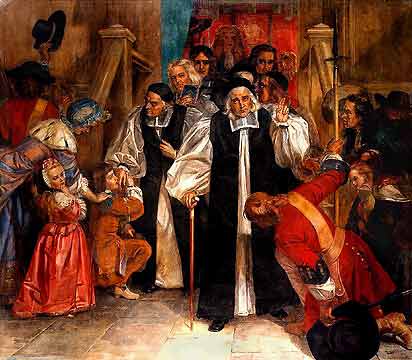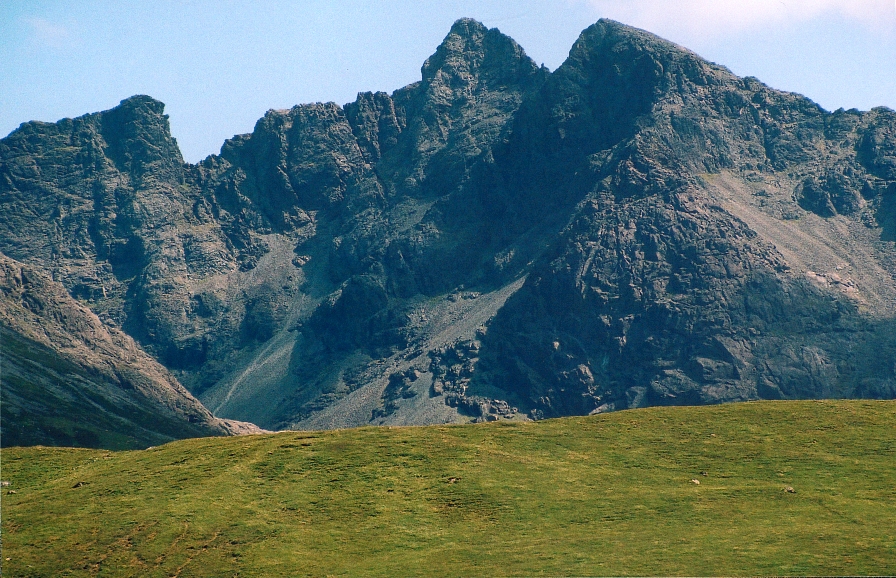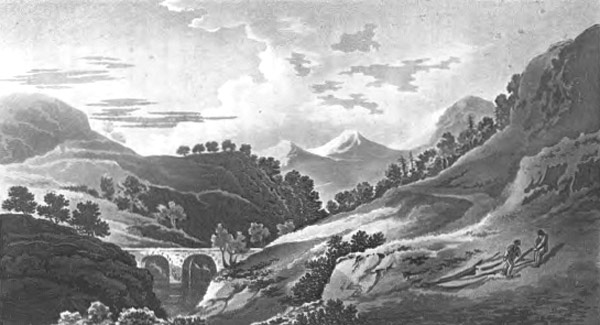|
Donald Macintosh
Donald Macintosh (1743–1808) was a Scottish clergyman, a nonjuror of the Scottish Episcopal Church, known as a scholar of Scottish Gaelic. Life Born at Orchilmore, near Killiecrankie, Perthshire, Macintosh was son of a cooper and crofter. After attending the parish school, and acting for some time as a teacher, he went to Edinburgh. In 1774 he was acting as one of Peter Williamson's penny postmen; he next found employment as a copying clerk, and was subsequently tutor in the family of Stewart of Gairntully. For some years from 1785 he was employed in the office of Mr. Davidson, deputy-keeper of the signet and crown agent. On 30 November 1786 Macintosh was elected to the honorary office of clerk for the Gaelic language to the Society of Antiquaries of Scotland, and held it until 1789. In 1789 James Brown, the sole representative of the nonjuring episcopal clergy of Scotland, made Macintosh as his successor, ordaining him deacon in June 1789, and later priest. Macintosh appears ... [...More Info...] [...Related Items...] OR: [Wikipedia] [Google] [Baidu] |
Nonjuring Schism
The Nonjuring schism refers to a split in the State religion, established churches of England, Scotland and Ireland, following the deposition and exile of James II of England, James II and VII in the 1688 Glorious Revolution. As a condition of office, clergy were required to swear allegiance to the ruling monarch; for various reasons, some refused to take the oath to his successors William III of England, William III and II and Mary II of England, Mary II. These individuals were referred to as ''Non-juring'', from the Latin verb ''iūrō'', or ''jūrō'', meaning "to swear an oath". In the Church of England, an estimated 2% of priests refused to swear allegiance in 1689, including nine bishops. Ordinary clergy were allowed to keep their positions but after efforts to compromise failed, the six surviving bishops were removed in 1691. The schismatic Non-Juror Church was formed in 1693 when William Lloyd (bishop of Norwich), Bishop Lloyd appointed his own bishops. His action was opp ... [...More Info...] [...Related Items...] OR: [Wikipedia] [Google] [Baidu] |
Robert Macfarlane (schoolmaster)
Robert Macfarlan (also Macfarlane) (1734–1804) was a Scottish schoolmaster, notable as a writer, journalist and translator. Life Macfarlan was educated at the University of Edinburgh, where he proceeded M.A. He settled in London, and for some years kept a successful school at Walthamstow, Essex. It was at Shern Lodge, also called Shernhall House, and he ran it from about 1770 to about 1795, when he left Walthamstow. His pupils included Robert Plumer Ward. At one time Macfarlane was editor of the ''Morning Chronicle'' and ''London Packet''. He reported, from memory, some of the major speeches in parliament during Lord North's administration, in particular from those delivered in the debates on the American War of Independence. In 1792 he was employed by the Highland Society of Scotland as a teacher of Scottish Gaelic. On the evening of 8 August 1804, during the election, Macfarlan was killed by an accidental fall under a carriage, at Hammersmith. Works Marfarlan was engaged ... [...More Info...] [...Related Items...] OR: [Wikipedia] [Google] [Baidu] |
Nonjurors Of The Glorious Revolution and to swear the Oath of Allegiance to the rebel state governments
{{disambiguation ...
A non-juror is a person who refuses to swear a particular oath: * In British history, non-jurors refused to swear allegiance to William and Mary and their heirs or abjure the Stuarts; see Nonjuring schism * In French history, non-jurors or Refractory clergy were clergy members who refused to swear an oath of allegiance to the state under the Civil Constitution of the Clergy; also known as refractory clergy, priests and bishops * In American history, non-jurors were citizens of the Thirteen Colonies who declined both to fight as Loyalists Loyalism, in the United Kingdom, its overseas territories and its former colonies, refers to the allegiance to the British crown or the United Kingdom. In North America, the most common usage of the term refers to loyalty to the British Cro ... [...More Info...] [...Related Items...] OR: [Wikipedia] [Google] [Baidu] |
Scottish Episcopalian Priests
Scottish usually refers to something of, from, or related to Scotland, including: *Scottish Gaelic, a Celtic Goidelic language of the Indo-European language family native to Scotland *Scottish English *Scottish national identity, the Scottish identity and common culture *Scottish people, a nation and ethnic group native to Scotland *Scots language, a West Germanic language spoken in lowland Scotland *Symphony No. 3 (Mendelssohn), a symphony by Felix Mendelssohn known as ''the Scottish'' See also *Scotch (other) *Scotland (other) *Scots (other) *Scottian (other) *Schottische The schottische is a partnered country dance that apparently originated in Bohemia. It was popular in Victorian era ballrooms as a part of the Bohemian folk-dance craze and left its traces in folk music of countries such as Argentina ("chotis"Span ... * {{disambiguation Language and nationality disambiguation pages ca:Escocès ... [...More Info...] [...Related Items...] OR: [Wikipedia] [Google] [Baidu] |
1808 Deaths
Eighteen or 18 may refer to: * 18 (number), the natural number following 17 and preceding 19 * one of the years 18 BC, AD 18, 1918, 2018 Film, television and entertainment * ''18'' (film), a 1993 Taiwanese experimental film based on the short story ''God's Dice'' * ''Eighteen'' (film), a 2005 Canadian dramatic feature film * 18 (British Board of Film Classification), a film rating in the United Kingdom, also used in Ireland by the Irish Film Classification Office * 18 (''Dragon Ball''), a character in the ''Dragon Ball'' franchise * "Eighteen", a 2006 episode of the animated television series ''12 oz. Mouse'' Music Albums * ''18'' (Moby album), 2002 * ''18'' (Nana Kitade album), 2005 * '' 18...'', 2009 debut album by G.E.M. Songs * "18" (5 Seconds of Summer song), from their 2014 eponymous debut album * "18" (One Direction song), from their 2014 studio album ''Four'' * "18", by Anarbor from their 2013 studio album '' Burnout'' * "I'm Eighteen", by Alice Cooper common ... [...More Info...] [...Related Items...] OR: [Wikipedia] [Google] [Baidu] |
1743 Births
Events January–March * January 1 – The Verendrye brothers, probably Louis-Joseph and François de La Vérendrye, become the first white people to see the Rocky Mountains from the eastern side (the Spanish conquistadors had seen the Rockies from the west side). * January 8 – King Augustus III of Poland, acting in his capacity as Elector of Saxony, signs an agreement with Austria, pledging help in war in return for part of Silesia to be conveyed to Saxony. * January 12 ** The Verendryes, and two members of the Mandan Indian tribe, reach the foot of the mountains, near the site of what is now Helena, Montana. ** An earthquake strikes the Philippines * January 16 –Cardinal André-Hercule de Fleury turns his effects over to King Louis XV of France, 13 days before his death on January 29. * January 23 –With mediation by France, Sweden and Russia begin peace negotiations at Åbo to end the Russo-Swedish War. By August 17, Sweden cedes all ... [...More Info...] [...Related Items...] OR: [Wikipedia] [Google] [Baidu] |
Lochaber
Lochaber ( ; gd, Loch Abar) is a name applied to a part of the Scottish Highlands. Historically, it was a provincial lordship consisting of the parishes of Kilmallie and Kilmonivaig, as they were before being reduced in extent by the creation of ''Quoad Sacra'' parishes in the 19th century. Lochaber once extended from the Northern shore of Loch Leven, a district called Nether Lochaber, to beyond Spean Bridge and Roybridge, which area is known as Brae Lochaber or ''Braigh Loch Abar'' in Gaelic. Lochaber is now also used to refer to a much wider area, one of the 16 ward management areas of the Highland Council of Scotland and one of eight former local government districts of the two-tier Highland region. The main town of Lochaber is Fort William. According to legend, a glaistig, a ghostly woman-goat hybrid, once lived in the area. Name William Watson outlined two schools of thought on this topic. He favoured the idea that ''Abar'' came from the Pictish and Welsh for "river m ... [...More Info...] [...Related Items...] OR: [Wikipedia] [Google] [Baidu] |
Waverley (novel)
''Waverley; or, 'Tis Sixty Years Since'' is a historical novel by Walter Scott (1771–1832). Scott was already famous as a poet, and chose to publish it anonymously in 1814 as his first venture into prose fiction. It is often regarded as one of the first historical novels in the Western tradition. Edward Waverley, an English gentleman of honour, chooses an occupation in the army at the time just before the Jacobite uprising of 1745 on advice of his father. He has an officer's commission. On leave from army training, he visits friends of his family in Scotland, as he is not far from their place. He enjoys their Scottish hospitality. His head is full of the romantic notions of his unstructured education, including much reading, and he is startled to find himself in the midst of loyalists who support the return of the House of Stuart and the Stuart prince, known as Bonnie Prince Charlie and the Young Chevalier to his supporters and as the Younger Pretender to his foes. His honou ... [...More Info...] [...Related Items...] OR: [Wikipedia] [Google] [Baidu] |
Walter Scott
Sir Walter Scott, 1st Baronet (15 August 1771 – 21 September 1832), was a Scottish novelist, poet, playwright and historian. Many of his works remain classics of European and Scottish literature, notably the novels ''Ivanhoe'', ''Rob Roy (novel), Rob Roy'', ''Waverley (novel), Waverley'', ''Old Mortality'', ''The Heart of Mid-Lothian'' and ''The Bride of Lammermoor'', and the narrative poems ''The Lady of the Lake (poem), The Lady of the Lake'' and ''Marmion (poem), Marmion''. He had a major impact on European and American literature. As an advocate, judge and legal administrator by profession, he combined writing and editing with daily work as Clerk of Session and Sheriff court, Sheriff-Depute of Selkirkshire. He was prominent in Edinburgh's Tory (political faction), Tory establishment, active in the Royal Highland and Agricultural Society of Scotland, Highland Society, long a president of the Royal Society of Edinburgh (1820–1832), and a vice president of the Society o ... [...More Info...] [...Related Items...] OR: [Wikipedia] [Google] [Baidu] |
Alexander Nicolson
Alexander Nicolson (1827–1893) was a Scottish lawyer and man of letters, known as a Gaelic scholar and sheriff-substitute of Kirkcudbright and Greenock, and as a pioneer of mountain climbing in Scotland. Life The son of Malcolm Nicolson, he was born at Husabost in Skye on 27 September 1827. With an early education from tutors, he entered Edinburgh University after the death of his father, intending to study for the ministry of the Free Church of Scotland. He graduated B.A. in 1850, and later in 1859 received an honorary degree of M.A. In the absence through illness of Sir William Hamilton, Nicolson as his assistant lectured for his class on logic, and for two years he performed a similar service for Patrick Campbell Macdougall in the class of moral philosophy. Giving up theology while at the Free Church College, Nicholson for some time worked as one of the sub-editors of the eighth edition of the Encyclopædia Britannica. He moved on, to the staff of the ''Edinburgh Guard ... [...More Info...] [...Related Items...] OR: [Wikipedia] [Google] [Baidu] |
Alexander Campbell (musician And Writer)
Alexander Campbell (1764–1824) was a Scottish musician and miscellaneous writer. Early life and education Campbell was born in 1764 at Tombea, Loch Lubnaig, and first educated at the grammar school, Callander, was the second son of a carpenter who, falling into straitened circumstances, removed to Edinburgh, where he died when Alexander was eleven years old. The family was supported by John, the eldest son, afterwards a well-known Edinburgh character (John Campbell died 1795, was precentor at the Canongate church, and a friend of Burns; his picture appears thrice in Kay's 'Portraits'). The two brothers were pupils of Tenducci, then a music teacher in Edinburgh, who helped to establish them both in his own profession. Campbell was appointed organist to an 'episcopalian chapel in the neighbourhood of Nicholson Street.' He also gave lessons in singing. Among his pupils were the Scotts. But the lads had no taste for the subject; the master had no patience. The result was that 'our ... [...More Info...] [...Related Items...] OR: [Wikipedia] [Google] [Baidu] |
David Erskine, 11th Earl Of Buchan
David (; , "beloved one") (traditional spelling), , ''Dāwūd''; grc-koi, Δαυΐδ, Dauíd; la, Davidus, David; gez , ዳዊት, ''Dawit''; xcl, Դաւիթ, ''Dawitʿ''; cu, Давíдъ, ''Davidŭ''; possibly meaning "beloved one". was, according to the Hebrew Bible, the third king of the United Kingdom of Israel. In the Books of Samuel, he is described as a young shepherd and harpist who gains fame by slaying Goliath, a champion of the Philistines, in southern Canaan. David becomes a favourite of Saul, the first king of Israel; he also forges a notably close friendship with Jonathan, a son of Saul. However, under the paranoia that David is seeking to usurp the throne, Saul attempts to kill David, forcing the latter to go into hiding and effectively operate as a fugitive for several years. After Saul and Jonathan are both killed in battle against the Philistines, a 30-year-old David is anointed king over all of Israel and Judah. Following his rise to power, David ... [...More Info...] [...Related Items...] OR: [Wikipedia] [Google] [Baidu] |



.jpg)



